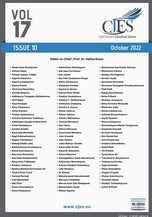The Arabic version of the technostress scale for primary school teachers: Factorial validity and measurement invariance
The Arabic version of the technostress scale for primary school teachers: Factorial validity and measurement invariance
Author(s): Mohammed L Roubi, Ali H Najmi, Zuheir N Khlaif, Abderrahim BenlahceneSubject(s): School education, Educational Psychology, Distance learning / e-learning, Pedagogy
Published by: Birlesik Dunya Yenilik Arastirma ve Yayincilik Merkezi
Keywords: CFA; technostress; quantitative approach; teachers;
Summary/Abstract: Teachers generally understand technostress to represent the psychological distress resulting from problems associated with teaching in a virtual classroom context. This study has been conducted to develop a tool to measure the level of technostress of primary school teachers. The current study evaluated the psychometric properties of the Technostress Scale (10 items) using a sample of 829 (490 female and 339 male) primary school teachers from different geographical regions of Saudi Arabia. The average age of the participants was 38.22, with a standard deviation of 7.08. Exploratory factor analysis produced one factor with eigenvalues of 5.01. This explained 50% of the variance. Confirmatory factor analysis revealed good model fits for one correlated factor, with a comparative fit index of 0.968, a Tucker–Lewis Index of 0.959, a standardised root-mean-square residual of 0.051, and a root mean-square error of approximation of 0.094. Although these multi-group analyses demonstrate that the structure factor of the technostress scale is invariant with respect to gender and experience, no differences were observed for the impact of training. This is due to the efforts of the Saudi Ministry of Education to provide the necessary training for teachers to use distance education tools.
Journal: Kıbrıslı Eğitim Bilimleri Dergisi
- Issue Year: 17/2022
- Issue No: 10
- Page Range: 3806-3820
- Page Count: 15
- Language: English

